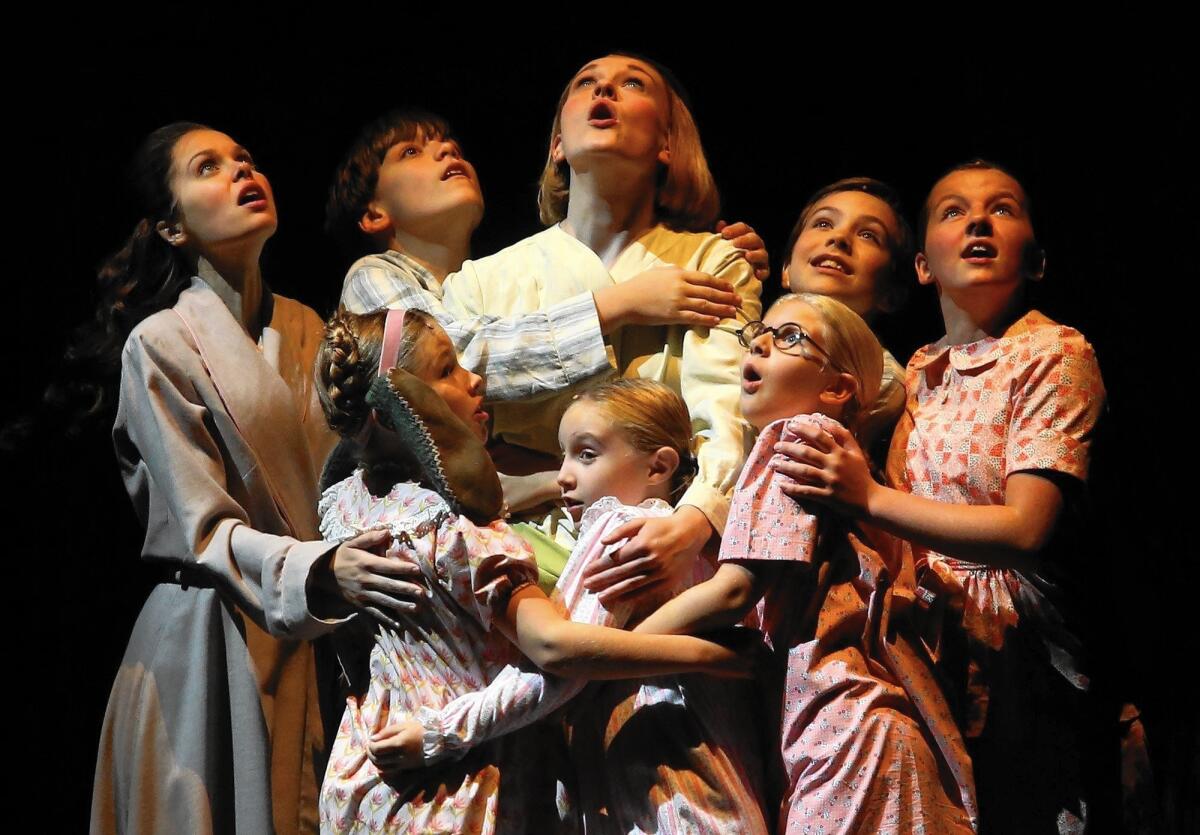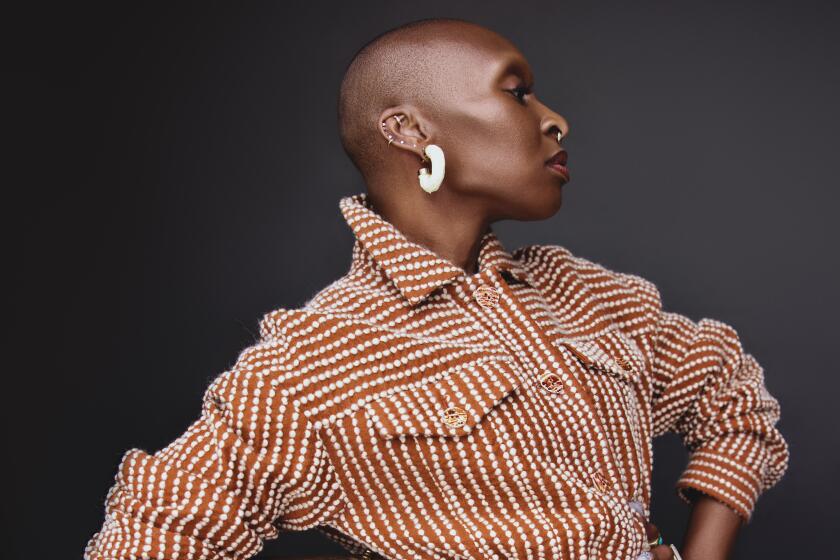Review: ‘The Sound of Music’ at the Ahmanson is fresh and lively

- Share via
It’s a romantic story: A young woman, plucked from her arcane studies, reinvigorates a stagnant community with the power of her song.
I’m referring, of course, to 20-year-old Kerstin Anderson, who plays Maria von Trapp in the revival of “The Sound of Music” beginning a national tour at the Ahmanson Theatre in Los Angeles.
Anderson was a sophomore in musical theater at Pace University in New York when she was discovered and thrust onto the world stage as a postulant at an Austrian convent. She and Maria could be one person.
Intimidatingly, she is preceded in the role by two of the most beloved stars in musical theater, Mary Martin and Julie Andrews. But Anderson takes charge with a spirit so joyful, a physicality so lithe and coltish, and a soprano so flawlessly soaring, that only Frau Schraeder, Captain von Trapp’s jilted fiancée (Teri Hansen), could possibly resist her charm.
SIGN UP for the free Essential Arts & Culture newsletter >>
I had heard that director Jack O’Brien, a three-time Tony Award winner as well as the former artistic director of the Old Globe in San Diego, was taking a radical new approach to the Rodgers and Hammerstein musical, which in 1959 premiered on Broadway and in 1965 was made into the enduring film. That made me anxious: What was he going to do to my “Sound of Music?”
I needn’t have worried: The Germans aren’t suddenly the good guys. Martians don’t land. O’Brien’s approach can be compared to the kind of painting restoration that strips away varnish that was too thickly applied during past efforts.
Douglas W. Schmidt’s set contributes to this effect: Its painted Alpine backdrops burst with brilliant colors. The walls of the Von Trapp mansion seem to be made of Salzburg lace. The dark cathedral where Maria and the Captain marry is gorgeously bathed in hazy sunlight from the high windows. It all looks so sparkling and fresh that the film in my memory seems slightly dingy by comparison.
That’s not to say that that film wasn’t on my mind as I watched. I was surprised by certain departures from what I took as gospel: At the Ahmanson, Maria sings “My Favorite Things” with an unexpectedly robust and frisky Mother Abbess (the powerhouse singer Ashley Brown, who starred in “Mary Poppins” on Broadway) rather than with the children during the thunderstorm. Maria sings “The Lonely Goatherd” during the thunderstorm instead — without the puppet show I understood as my due. It’s the saucy child Brigitta (Svea Johnson) rather than the scheming Frau Schraeder who informs Maria that Captain von Trapp is in love with her.
But all three scenes turn out to be from the original script: They were changed for the movie. This production also includes two songs that didn’t appear in the film: “How Can Love Survive?” and “No Way to Stop It.” Both are sung by Frau Schraeder and her friend Max Detweiler (Merwin Foard), the slightly unscrupulous but lovable talent agent who gives the Trapp Family Singers their first break.
Both numbers add nuances: We learn from the first that Frau Schraeder is a cynic, whose motives for marrying the Captain are corporate rather than romantic; and from the second, we learn that both she and Max intend to cooperate with the German invaders, unlike the idealistic, patriotic captain. The songs are catchy and lively, and yet, still, not entirely necessary. During both, I noticed my young companion craning her neck for the next appearance of the adorable Von Trapp children.
All seven of them, by the way, are well cast and directed: from the tiny Gretl (Audrey Bennett) to the blossoming 16-year-old Liesl (Paige Silvester), whose romantic duet with the gawky teen Rolf (Dan Tracy) is choreographed by Danny Mefford with a vivid innocent sexuality, culminating in a steamy kiss. I found all of them more natural and likable here than the children in the film. Maria is able to win them over with remarkable speed — it takes just one round of “Do-Re-Mi” — but then again, she had the same effect on me.
Christopher Plummer’s Captain von Trapp, in the movie, was instrumental in forming my concept of romantic love: From him I learned that the man would be stiff and forbidding and would always look slightly annoyed, even if waltzing with me in a gazebo. (I didn’t learn until much too late that Plummer was often hung over during the filming of the movie)
Ben Davis makes a noticeably friendlier Captain, one I am even emboldened to call Georg. Yes, he is stern and awkward with his seven children, dressing them in sailor suits and treating them like a naval crew, but after a bit of pro-forma bluster, he is eager under Maria’s influence to change his ways. The budding couple’s rapport, meanwhile, is the opposite of stiff: The way they melt into each other suggests that they’re not marrying just for the sake of the children. “So much kissing!” my young companion observed.
In the same way, the Nazis’ threat to the new lovers’ idyll has become more visceral: The German encroachment on Austria is visually as well as emotionally jarring, especially when the family must perform in their quaint folk costumes in front of blood-red banners emblazoned with swastikas.
Perhaps the most unexpectedly moving aspect of the production is its loving portrayal of the nuns, who rather than the slightly comical figures of the movie seem here to be the steady moral center of the world, deep in their dark cloister, quietly protecting the needy and smiling on love. Watching them dress Maria in her wedding dress (a knockout by costume designer Jane Greenwood) made me wish faith could be a source of comfort in our world, instead of the excuse for hate it all too frequently becomes.
------------
‘The Sound of Music’
Where: Ahmanson Theatre, 135 N. Grand Ave., Los Angeles
When: 8 p.m. Tuesdays-Fridays, 2 and 8 p.m. Saturdays, 1 and 6:30 p.m. Sundays (call for exceptions); ends Oct. 31
Tickets: From $25-$150
Info: (213) 628-2772, www.centertheatregroup.org
Running time: 2 hours, 40 minutes
More to Read
The biggest entertainment stories
Get our big stories about Hollywood, film, television, music, arts, culture and more right in your inbox as soon as they publish.
You may occasionally receive promotional content from the Los Angeles Times.










